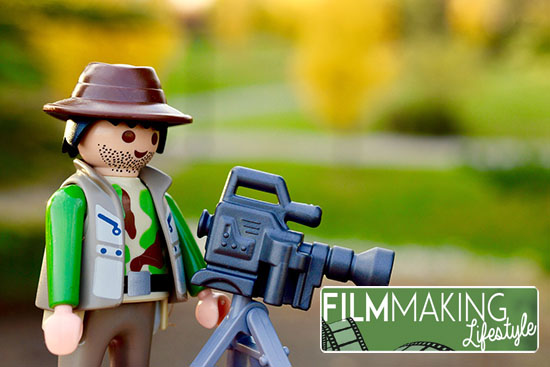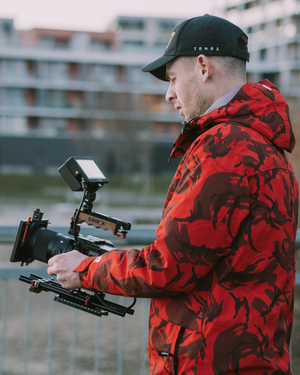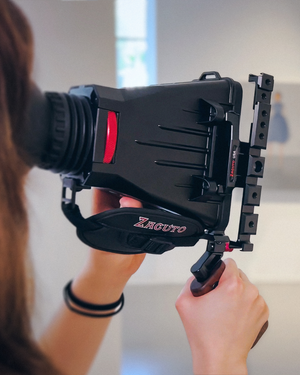
Becoming a Filmmaker - 9 Things No One Tells You
by Matt Jacobs
Whether you’re setting out on becoming a filmmaker or trying to get a video production company started: It’s certainly not the easiest thing in the world. It’s hard work.
When I look back on my career as a filmmaker and owner of a video production company, I often think about what I wished I’d known when I was starting out.
This article could be a key breakthrough for someone starting out. It will be an interesting mental exercise for experienced filmmakers, who I’m sure can relate to some of this.
 Start small and scale up:
Start small and scale up:
Start with mentioning what you're doing to friends and industry friends at parties.
Post on social media. A Facebook and Instagram business account is a great first step.
Don’t be afraid to talk about what you’re doing, what your hopes and dreams are and what you’re working on.
The key thing here is to not be afraid of telling people what you’re doing and what you hope to do. This is how you gain traction for your ideas and your business. Most people will be supportive and love to hear stories of success and motivation. This is inspiring to people!
What if you find someone who isn’t supportive? Well, you just found someone who you probably shouldn’t have in your life. Congratulations.




1. BELIEVE IT’S HAPPENING MINDSET
It’s not rocket science, when you believe something’s going to happen, you make it much more likely that it will happen. We’re not getting all The Secret on you here. There are troubles and setbacks, and some people have it harder for whatever reason. In order to take your success to the next level, you need to believe it’s happening. This is a mindset that you can grow in yourself. Let me explain and put this in practical terms with an example: Let’s say you’ve been plugging away at growing your video production business for 1 and a half years now. You’re past the stage where you’re doing free work for friends (and friends of friends) and you’re starting to see some traction as far as leads coming in and people wanting to talk about what you do. Now is the best time to start believing success is happening. In this way, you will success into reality. You start seeing yourself as big time. It’s not “fake it till you make it,” you become the reality. So you start waking up and going about your daily routine and you hold it in your head: “it’s happening, it’s starting.” You make yourself a coffee and it’s going through your head, “It’s happening.” As you’re dropping off to sleep at the end of a hard day of making things happen, you repeat to yourself: “It’s happening.” I did. It’s not just watered-down positive thinking, either. As long as you’re taking consistent and committed action, and your action is backing up what you’re saying, it’s always true.2. LEARN TO PROMOTE YOURSELF
Learning to promote yourself is absolutely essential. If you don’t, who else will? And, while you’re at it, drop the, “I don’t want to come across as arrogant” frame of mind. Yes, we’re filmmakers. We’re artists. So many of us hate the idea that we have to “sell ourselves.” It’s why most artists and creative folks are bad at interviews. Not all, but most. And it’s also why so many filmmakers hate the idea of marketing and selling our services. Still, if you want to be successful, you have to get past this. So how do you get over this distaste with promoting yourself? Well, first of all you realize that it’s not an ego thing. This is business, this is life — we’re all selling ourselves every moment of every day. Life is a process of selling ourselves and our ideas. That doesn’t mean we need to slick back our hair, put on the offensive cologne and the caricature smile and start hawking used cars. It’s not just about money and ‘making sales.’ No, selling ourselves is much more subtle. It’s about putting the right foot forward during every meeting, every project and every piece of work that we put out there. Selling may be the most important life-skill.3. TELL EVERYONE IT’S HAPPENING MINDSET
Closely linked to the, “Believe it’s happening” mindset, this mindset assumes you’re self-confident enough to tell friends, family, and colleagues that “it’s happening.” That your business is taking off. How do you do this? You get good at number 1) above. You practice telling yourself that it’s happening. Not to be confused with “fake it till you make it.” Once you’re confident enough with telling yourself that it’s happening, you can then move onto telling other people that it’s happening. In this way, this third point is similar to number 2 as well. By telling everyone it’s happening, we’re promoting ourselves. This is a kind of a specific tactic of number 2. Our networks are our biggest promoters and they’ll be the people who get you most of your work, and especially your early work. By network I mean your friends, family, colleagues and other people in your industry. As well as those connected in some way to your industry.
4. GET BUSY AND WORK WILL COME
They say that if you’re always on the move, it’s hard to stop. We’re all familiar with Newton’s law about objects in motion staying in motion. Well, it works the opposite way, too. If you’re static for too long, it’s hard to get in motion. So be busy. Force yourself to be busy. Even if that means helping out on film projects for friends if your business is slow. The more action you have in your life, the more opportunity you’ll find. Keep moving, keep hustling and you’ll find more work than you could ever need.
5. DON’T DO WORK FOR FREE. ALWAYS ATTACH A PRICE TAG
Yes, in the previous point, I mentioned helping out friends on their projects in order to stay active and in motion. However, I didn’t say that you should work for free. In earlier parts of my career and becoming a filmmaker, I was very keen on promoting the idea that people in video production needed to work for free in order to get started. And I still believe in that to a certain degree. When starting out, it’s a hard sell to get big budget video production contracts if you have no track-record. Still, I’ve learned the hard way as my career has developed that what people promise you in order to get you to work for free doesn’t always turn out to be a reality. Yes, I’ve heard it all. “This job will put you in touch with a great network and awesome connections.” “It’s a charity project, we’ll provide all equipment, we just need you to show up, shake a few hands and film the event. We don’t even need you to edit anything afterward!” Sound familiar? With the first one, you don’t always get this amazing super-shiny network and all the great connections. With the second example, and this was a real project, the “equipment” ended up being a $200 camcorder and a photography tripod, so we had to use our own kit anyway. And, yes, you guessed it — we ended up getting asked to edit it for free, too (and, no, we didn’t do it). Now, I don’t mean to be all cynical here. It’s great to do charity projects for free if you believe in the cause, and giving back to your community is fulfilling and should be a civic duty. Still, just know that what you’re promised, in the absence of a contract, isn’t always what you get. When it comes to free projects, I’ve heard so many stories of filmmakers and videographers being used and abused that I believe in 95% of cases, the person who’s getting the job for free has significantly stacked the pros in their favor. The other important point about doing work for free, aside from the promises that nearly always come at the beginning, is the pure fact of human nature: people value free things much less than things they pay for. So, my rules for doing things for free: do it when you’re starting out if you have to. But, with the exception of helping out friends and causes that you believe in, cut loose on freebies as early as possible!
6. NO ONE’S GOING TO GIVE IT TO YOU. YOU NEED TO GET OUT THERE AND TAKE WHAT YOU WANT
Some people sit around waiting for things to come to them. They’ll be waiting a long time. The people who really make a mark on this world are those who go out there and make it happen. Take a successful business-person like British entrepreneur Duncan Bannatyne. He was a beach bum who went from odd job to odd job struggling to make ends meet until he was 31 years old. At 31, he decided he needed a more sustained income. He started a very small business selling ice-cream from a single van. He scaled that up in a few years and sold it for a hefty chunk of change. From there, he went into the elderly care-home business, despite people’s warnings that it was a bad business and he didn’t even know the market. Nearly every bank turned him down, people thought he was crazy, and he didn’t even have a mortgage on the property when he started the building work. In fact, he couldn’t even afford to pay the builder and he ended up selling off his possessions piece by piece to make each of the builder’s monthly payments! Finally, the care-home was complete and it was a massive success. From there, he eventually transitioned into the gym/health club market that he’s most famous for, before becoming a Dragon on the popular BBC TV show Dragon’s Den. I forgot to mention that Bannatyne did all this after growing up incredibly poor in a very working class part of Glasgow, Scotland. He left school with no real formal qualifications to speak of and most people assumed he was destined to follow the standard family career path of working his skin to the bone in manual labor. I tell this story to illustrate the point. Duncan Bannatyne didn’t ask permission. He knew what he wanted and he went after it. No one gave him anything. He went out there and took what he wanted.
7. YOU WILL NEED TO START BEFORE YOU’RE READY: AKA, READY, FIRE…AIM
In his book, Ready, Fire, Aim, Michael Masterson postulates that success as an entrepreneur has a lot to do with how quickly you can start and how quickly you can assess results and make improvements. So the idea behind Ready, Fire, Aim is that you start before you’re done all the planning. This is important for entrepreneurs like us in competitive spaces like filmmaking and video production. Yes, planning is hugely important, of course. This isn’t about throwing yourself haphazardly into multiple projects at the same time. It’s about doing a minimum of planning that will get your idea or project or goal off the ground, and then quickly made adjustments as you go. This is similar to the infamous Silicon Valley method of working lean. The lean framework involves getting a working prototype of a product ready as soon as possible. From there, adjustments are made and the product is iterated again and again until it’s perfect. A classic example of the lean method at work is the way famed entrepreneur Elon Musk has painstakingly developed and designed all the cars that the Tesla company have created.8. THE FEAR OF THE DEATH OF THE DREAM IS REAL
So many people don’t get started (ever get started), because they’re so keen on protecting their dream. What do I mean by this? What I mean is that when starting a risky project, or embarking on a goal that might not be fulfilled, it’s human nature to protect oneself. By not taking action, you preserve the dream of getting that goal. So in practical terms, what we have is a whole lot of people talking the talk and not taking action. They might tell their friends and family, talk about their goals at parties and even write openly about it on social media. But when it comes to pushing down on the pedal and taking action, these same people leave a lot to be desired. So how do we conquer this fear of the death of the dream? This one, like most of the 9 points in this post, is a real gray area. And it’s certainly not something that many people will talk openly about. But, take it from me as someone who’s been there and done it, I’ve experienced this fear myself. In fact, I know it intimately. The key thing to remember is that great things happen when we get out of our comfort zones. Yes, it sounds like a cliche (and maybe it is), but it’s very true. If you want to do something, if you want to achieve a goal, you have to take steps towards achieving it. It’s the same with becoming a filmmaker. Sounds obvious when I write it down, but so many people miss this part. Sure, your steps will be small at first, but as you grow in confidence, so will the steps you take towards your goal. I’m evidence of that. So there’s no easy, cure-all solution to this issue. I write it here to raise awareness. Because knowing is half the battle. You must first find your own path. But, once you find that path, taking it is the most important step.9. YOU CAN’T DO IT ALL YOURSELF: DON’T WEAR ALL THE HATS
Now, look, I’m not saying you can’t run a good business with just yourself, the brain between your ears and your fair fingers. You can. What I’m talking about here is expanding your business. Once you get to a certain level and the work is coming in thick and fast, you’ll find things like project creep and related issues are killing you. Some of the worst business crash and burn stories I’ve heard (not just in the video production area) have come where a business owner tries to do everything themselves, and they eventually get completely burnt out. And the sad thing is: they’re good. In order to crash and burn, they had to be good. In order to crash and burn, they needed to be overwhelmed with tons of projects. And to been overwhelmed with tons of projects, you have to be so good that lots of people want to work with you. So what you see is some folks going out there and trying to do everything in their businesses: admin stuff, taxes, accounting, client outreach, prospecting, emails, advertising, web design, graphic design, sales, and marketing…the whole shebang. And that’s not even touching on actually doing the work within the business. In his famous book, The E-myth Revisited (which launched a whole suite of coaching programs), Michael Gerber said, “Work on your business, not in it.”Work on your business, not in it.
Gerber’s advice centers around building a team that helps you work on your business more effective. Called outsourcing, this is one of the best ways to scale your operation and it’s something I’ve talked about a lot on this site.
It’s about finding the best people for each job and letting them do their best work. This way, you buy time for yourself to focus on the more revenue generator activities that will truly grow your business.
This is just the tip of the iceberg, and I should probably write an article all about E-Myth thinking and how it relates to your video production business, but for now, think of it this way: by outsourcing, you are buying time back to use in your business in more effective ways.
BECOMING A FILMMAKER
When I look back, I wished I’d known these 9 points well when I started out. Still, sometimes you have to experience them for yourself before they sink in properly. It’s one thing reading them, but experiencing them intimately is sometimes the only way to truly learn. What struggles have you had with your filmmaking career? What is the hardest part about becoming a filmmaker? What struggles have you had starting and growing your video production company? Let me know in the comments below.


Leave a comment